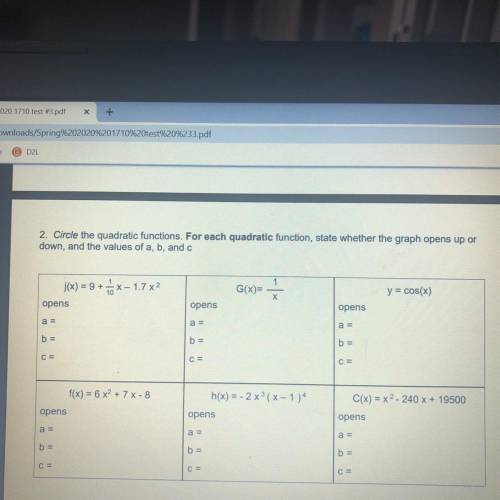
Mathematics, 21.04.2020 20:54 Bellzers8328
2. Circle the quadratic functions. For each quadratic function, state whether the graph opens up or
down, and the values of a, b, and c
T
j(x) = 9+ -*- 1.7x2
opens
G(x)=
y = cos(x)
opens
opens
a =
a =
f(x) = 6 x2 + 7 X - 8
opens
h(x) = - 2 x3 (x - 1)
opens
C(x) = x2 - 240 x + 19500
opens
a =
a =
a =


Answers: 2


Another question on Mathematics

Mathematics, 20.06.2019 18:04
You will get 25 points an image of a rectangular prism is shown below: part a: a cross section of the prism is cut with a plane parallel to the base. what is the name of the shape created by the cross section? explain your answer. (5 points) part b: if a cross section of the prism is cut perpendicular to the base, what would be the shape of the resulting cross section? explain your answer. (5 points)
Answers: 1

Mathematics, 21.06.2019 17:00
Can someone pls ! pls answer all. no explanation needed..
Answers: 1

Mathematics, 21.06.2019 21:40
Write the contrapositive of the conditional statement. determine whether the contrapositive is true or false. if it is false, find a counterexample. a converse statement is formed by exchanging the hypothesis and conclusion of the conditional. a) a non-converse statement is not formed by exchanging the hypothesis and conclusion of the conditional. true b) a statement not formed by exchanging the hypothesis and conclusion of the conditional is a converse statement. false; an inverse statement is not formed by exchanging the hypothesis and conclusion of the conditional. c) a non-converse statement is formed by exchanging the hypothesis and conclusion of the conditional. false; an inverse statement is formed by negating both the hypothesis and conclusion of the conditional. d) a statement not formed by exchanging the hypothesis and conclusion of the conditional is not a converse statement. true
Answers: 1

Mathematics, 22.06.2019 01:30
(01.02 mc) asap plzzzwhich of the following correctly simplifies the expression 3 to the power of 2 multiplied by 5 to the power of 0 whole over 4, the whole squared.? select one: a. 3 to the power of 2 multiplied by 1 whole over 4, the whole squared. = 3 to the power of 1 multiplied by 1 squared over 4 squared. = 1 over 6.b. 3 to the power of 2 multiplied by 0 whole over 4, the whole squared. = 3 to the power of 4 multiplied by 0 over 4 squared. = 0c. 3 to the power of 2 multiplied by 0 whole over 4, the whole squared. = 3 to the power of 1 multiplied by 0 over 4 squared. = 0d. 3 to the power of 2 multiplied by 1 whole over 4, the whole squared. = 3 to the power of 4 multiplied by 1 squared over 4 squared. = 81 over 16.
Answers: 1
You know the right answer?
2. Circle the quadratic functions. For each quadratic function, state whether the graph opens up or<...
Questions

Mathematics, 07.11.2020 02:20

Chemistry, 07.11.2020 02:20

Geography, 07.11.2020 02:30





French, 07.11.2020 02:30

Mathematics, 07.11.2020 02:30

Chemistry, 07.11.2020 02:30


Mathematics, 07.11.2020 02:30

Mathematics, 07.11.2020 02:30

History, 07.11.2020 02:30

Mathematics, 07.11.2020 02:30



Mathematics, 07.11.2020 02:30


Mathematics, 07.11.2020 02:30



